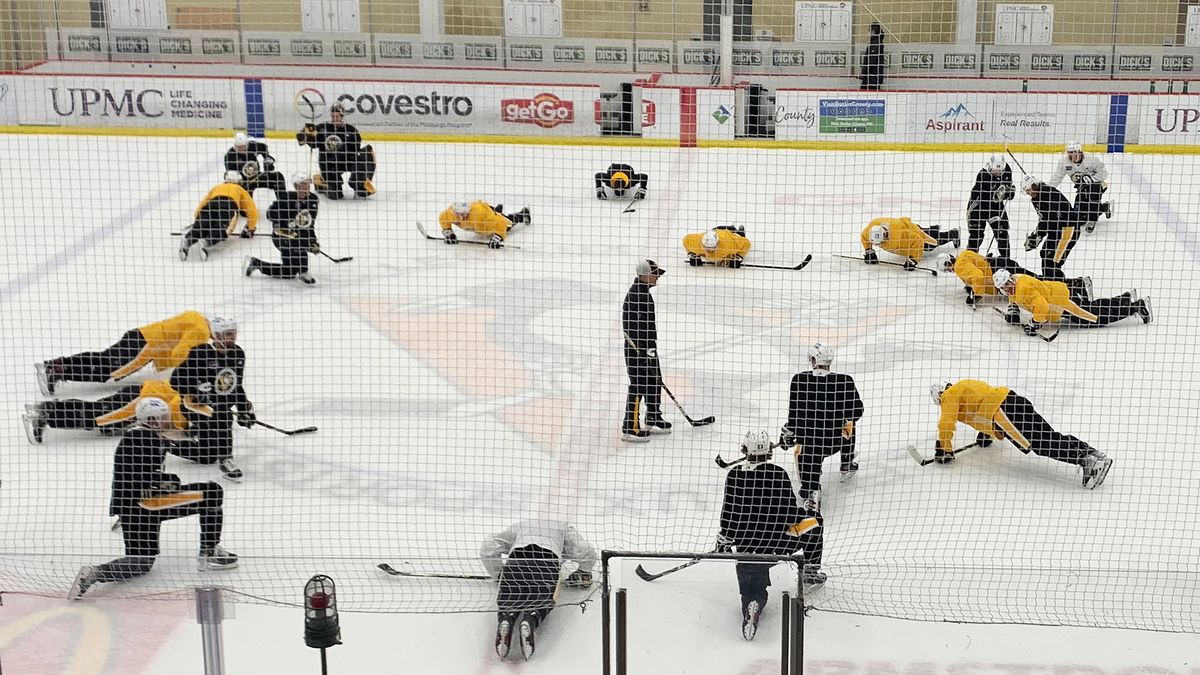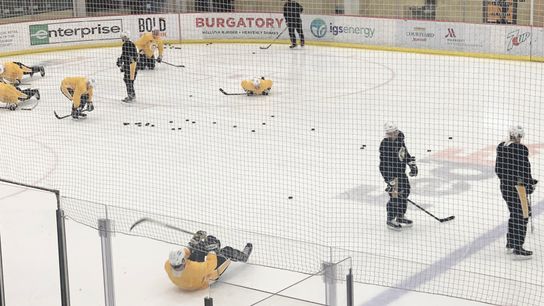CRANBERRY, Pa. -- When skills coach Ty Hennes leads the team in drills during practices, there's often a competition element to them.
Players will typically be divided into two groups, and the group that loses the drill will have to face some sort of consequence. Usually, it's just pushups.
It's a fun way to keep the drills competitive. Everyone wants to win.
Nobody takes these competitions more seriously than Evgeni Malkin does, however.
We see it often during these drills. If a call doesn't go in Malkin's favor, or he thinks an opponent bent the rules a little, he'll plead his case to one of the coaches or a member of the opposing group. If his group wins the drill or scores a goal, he's typically the first one to throw his arms up in the air in celebration, reacting as if it was a real game.
More often than not, Malkin's group seemingly comes away with the win. Which means more often than not, the opposing group has to do pushups.
Malkin's taken on the responsibility of enforcing those punishments.
There was an instance in the last practice before the team's holiday break. Malkin's team had won, but Hennes didn't make the losing team do pushups. Malkin loudly pleaded his case to both Hennes and Mike Sullivan that the losing side had to face the consequences, and he eventually got his way. He knelt on the outside of the circle, whacking Marcus Pettersson on the back of the skates, eventually telling Pettersson to do pushups again, either because he didn't think Pettersson did enough or wasn't satisfied with the quality of them.

TAYLOR HAASE / DKPS
Evgeni Malkin (top right) ensures that the losing group completes the required pushups in their practice before the holiday break.
The Penguins opened Saturday's practice with a three-on-three keepaway-type drill in one corner. Malkin wasn't happy with the outcome of the first run-through, and was jokingly arguing with Brian Boyle from the opposing side afterward. Malkin's group ultimately won the drill, and the other team had to do pushups.
Boyle didn't drop to the ice as quickly as the rest of his group did, and Malkin made sure that Boyle wasn't trying to escape the consequences. He skated over to Boyle, and with a big smile on his face, started yelling at Boyle while pointing to the ice.
Boyle complied, but opted for sit-ups instead of pushups, which Malkin evidently deemed acceptable.

TAYLOR HAASE / DKPS
Evgeni Malkin (right) skates away after making sure the gold team did their pushups (or sit-ups, in Brian Boyle's case)
I asked Mike Matheson after practice about how seriously Malkin takes these drills (and the enforcement of the pushups), and Matheson broke into a grin.
"I think he keeps things light, which is good to have," Matheson said of Malkin. "Through a long season, it can be tough, especially if the team isn't playing great, or individually you're feeling like your game isn't where it needs to be. And then you see that he's just keeping it light and not taking things too seriously. I think that's a huge part of the different elements of what goes into having a good team. He's definitely going to bring in that."
Malkin makes teammates laugh with the way he treats these drills, but he's not just out there having fun. It stems from a serious drive to compete and win in these things, as low-stakes as they are. That competitiveness permeates through the rest of the team.
"I don't think anybody out there wants to lose, especially him," Brock McGinn said of Malkin in these drills. "I think he battles very hard out there in practice, and that's what you want in this team. I think all the leaders out there in practice work so hard, and I think that carries through the rest of the lineup and that leads into games."
Malkin has missed the last two games due to COVID protocols, and appears set to make his return on Sunday in New Jersey. Though Sullivan designated Malkin a "game-time decision," he said that he anticipates Malkin being in the lineup against the Devils. The personnel combinations were an indication that Malkin is likely to play, with him rejoining the top power play unit in the special teams work and centering the second line between McGinn and Kasperi Kapanen.
"He's obviously highly skilled and a lot of fun to watch," McGinn said of playing on Malkin's line. "So I think as much as I can get the puck in his hands, the better. I think it's just doing that, try and give him space with it and try and get open for him."
MORE FROM PRACTICE
• Coaches aren't immune from the Penguins' bad luck with injuries. Todd Reirden slipped on ice while shoveling his car out of his driveway and needs knee surgery. More on that, and how the team plans to compensate for his absence, can be found here.
• The Penguins used these lines and pairings:
Jake Guentzel - Sidney Crosby - Bryan Rust
Brock McGinn - Evgeni Malkin - Kasperi Kapanen
Danton Heinen - Jeff Carter - Evan Rodrigues
Zach Aston-Reese - Brian Boyle - Dominik Simon
Brian Dumoulin - Kris Letang
Marcus Pettersson - John Marino
Mike Matheson - Chad Ruhwedel
Drew O'Connor, Radim Zohorna and Mark Friedman didn't take regular line rushes and rotated in. O'Connor remained a full participant with contact, though, as he works his way back from what was reported to be a collapsed lung.
• The top power play was Kris Letang, Sidney Crosby, Jake Guentzel, Bryan Rust, Malkin
• The second power play was John Marino, Danton Heinen, Jeff Carter, Kasperi Kapanen, Evan Rodrigues
• Matheson is a big advocate for women's hockey, with his wife Emily Pfalzer playing defense on Team USA, winning an Olympic gold medal and four World Championship gold medals before taking some time off for the birth of their son. He was happy to the Canucks hire two woman assistant general managers in Emilie Castonguay and Cammi Granato recently, because it shines more light on the hard-working women in the game.
"I think it's great," he said. "I think throughout the league, there's been a lot of players. Kendall Coyne has been working with Chicago a lot. It's great because it's overseen how much work they put into their game with very little notice or attention on it. I've seen it firsthand where Emily was competing in the Olympics, which was great for that three weeks. But nobody saw the other three years and nine months of work that went into that, where she was skating alone, training alone, which is so boring and tedious to do. But she stuck with it. ... World Championships is once a year. We get to play 82 games a year and have that competitive environment so often to be able to show what we worked on. I think the fact that that's been getting noticed more and more and utilized in a great way has been huge for the game."

